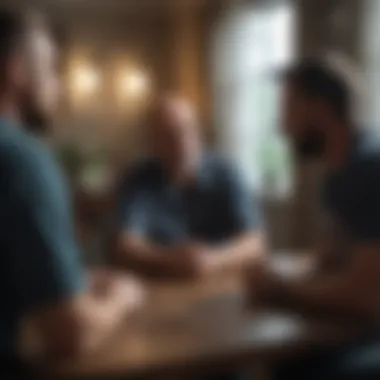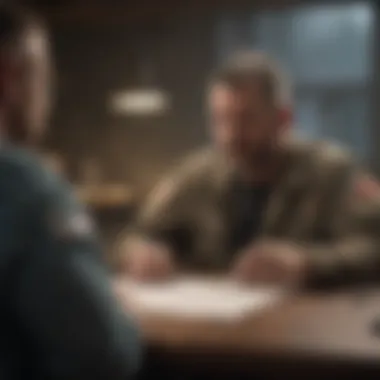Discover the Benefits of Veteran PTSD Support Groups Near You


Understanding Relationship Dynamics and Challenges
In the realm of veteran PTSD support groups, understanding relationship dynamics and challenges is paramount. Veterans often face unique relationship issues stemming from their experiences during service. These groups aim to address common difficulties encountered by men in their interactions, offering a safe space where effective communication techniques and strategies for resolving conflict are emphasized. By delving into these dynamics, individuals can foster healthier relationships and navigate challenges better.
Personal Growth and Development
Transitioning to personal growth and development, these support groups provide a platform for veterans to focus on self-improvement. Offering tailored tips for men on enhancing various aspects of their lives, including setting goals and achieving success, managing stress, and prioritizing wellness. The emphasis lies on empowering individuals to harness their potential, cultivate resilience, and thrive post-deployment amidst the complexities of PTSD.
Masculine Lifestyle Choices
Within veteran PTSD support groups, discussions extend to guiding men towards optimal lifestyle choices. Addressing areas such as men's fashion and grooming tips, health and fitness guidance, and exploring hobbies and interests, these groups promote a holistic approach to well-being. Encouraging members to maintain a balance between physical, mental, and emotional well-being while navigating the intricacies of day-to-day life.
Building Strong Conntections
The establishment of strong connections takes center stage in veteran PTSD support groups, focusing on strengthening existing friendships and social circles. Additionally, these groups offer insights into nurturing romantic relationships and developing effective networking techniques. By fostering a sense of community and camaraderie, individuals can forge meaningful connections and support networks that serve as pillars of strength as they navigate the complexities of PTSD.
Enhancing Emotional Intelligence
Lastly, enhancing emotional intelligence serves as a core pillar in support groups for veterans grappling with PTSD. Exploring facets such as understanding and regulating emotions, practicing empathy and compassion in relationships, and cultivating healthy boundaries aids in fostering emotional resilience and stability. By honing emotional intelligence skills, individuals can navigate interpersonal interactions more effectively, leading to improved overall well-being.


Understanding Veteran PTSD Support Groups
In this article, delving into Understanding Veteran PTSD Support Groups holds utmost significance as it shines a light on the crucial realm of support available for veterans grappling with post-traumatic stress disorder (PTSD). By closely examining the essence of these support groups, individuals can unravel a wealth of assistance and camaraderie essential for navigating the complexities of PTSD. This discussion will expound upon various elements, benefits, and considerations that revolve around the realm of Understanding Veteran PTSD Support Groups, shedding profound insights into the pivotal role such groups play in the lives of veterans.
What are Veteran PTSD Support Groups?
Veteran PTSD Support Groups serve as safe havens designed to bring together individuals who have served in the military and are battling the harrowing effects of PTSD. These groups typically involve structured meetings where veterans can openly share their experiences and emotions, fostering a sense of mutual understanding and solidarity. Through facilitated discussions and activities, these support groups aim to provide a platform for veterans to connect, heal, and grow in a supportive environment tailored to their unique needs and challenges.
Importance of PTSD Support
The importance of PTSD support cannot be overstated, especially within the veteran community where the prevalence of PTSD can have profound impacts on individuals' mental health and well-being. Access to dedicated support groups ensures that veterans have a space where they can feel heard, validated, and supported in their journey towards recovery. By acknowledging the significance of mental health support, particularly in the context of PTSD, individuals can take proactive steps towards addressing their challenges, finding solace in the understanding and empathy that such support groups offer.
Benefits of Support Groups
Participating in veteran PTSD support groups yields a myriad of benefits, ranging from emotional support to practical coping strategies. These groups provide a sense of camaraderie and understanding that can be instrumental in alleviating feelings of isolation and loneliness commonly experienced by veterans with PTSD. Additionally, the exchange of experiences and coping mechanisms within these groups empowers veterans to learn from one another, acquire valuable skills for managing their symptoms, and build resilience in the face of adversity. By delving into the realm of support groups, individuals can harness these benefits to foster personal growth and healing within a nurturing community context.
Locating Support Groups Near You
Exploring the options available for locating veteran PTSD support groups near you is a critical aspect of the journey towards healing and recovery. By understanding how to access these essential resources, individuals can take significant steps in addressing their post-traumatic stress disorder. Notably, the proximity of support groups plays a pivotal role in ensuring easy accessibility for veterans in need of assistance. Additionally, being able to connect with like-minded individuals who understand their experiences creates a sense of belonging and mutual understanding within the community. Furthermore, the convenience of having support groups nearby enhances the likelihood of regular participation, fostering consistent emotional support and camaraderie
Utilizing Online Resources


When it comes to locating veteran PTSD support groups, the utilization of online resources emerges as a valuable tool. Online platforms provide a plethora of information about various support groups, their meeting schedules, and the type of assistance they offer. Veterans can access these resources from the comfort of their homes, making it easier to explore multiple options and find a support group that aligns with their needs. Moreover, online forums and websites dedicated to veteran mental health facilitate connections between individuals who may not have access to in-person support groups in their immediate vicinity. By leveraging online resources effectively, veterans can expand their support network, access valuable information, and engage in discussions that promote healing and well-being.
Exploring In-Person Support Options
In the comprehensive landscape of veteran PTSD support groups, the facet of in-person support options holds substantial significance. This section delves into the pivotal role that in-person interactions play in aiding individuals dealing with post-traumatic stress disorder and the specific benefits it offers in complementing online resources.
Community Centers
Community centers serve as focal points for individuals seeking face-to-face support in dealing with PTSD. These centers offer a safe and welcoming environment where veterans can come together, share experiences, and provide mutual assistance. Through group discussions and activities tailored to address specific needs, community centers foster a sense of belonging and understanding among participants. Additionally, trained professionals often lead these sessions, ensuring that individuals receive the necessary guidance and support in their journey towards healing and resilience.
Veterans Affairs Centers
Veterans Affairs Centers stand out as essential pillars of support for veterans navigating the complexities of post-traumatic stress disorder. These centers specialize in understanding the unique challenges faced by veterans and offer tailored programs and services to address their mental health needs. From individual counseling sessions to group therapy programs, Veterans Affairs Centers provide a holistic approach to supporting veterans in their recovery journey. By collaborating with experienced professionals and connecting with peers who share similar experiences, individuals can access a comprehensive support network that promotes healing and well-being.
Local Non-Profit Organizations
Local non-profit organizations play a vital role in augmenting the support available to veterans with PTSD. These organizations often have a deep-rooted connection to the community they serve, allowing for a more personalized and localized approach to addressing mental health challenges. By partnering with mental health professionals and leveraging community resources, non-profit organizations offer a range of services, including therapy sessions, support groups, and educational workshops. Through these initiatives, veterans can access tailored support that takes into account their unique backgrounds and experiences, fostering a sense of empowerment and resilience. The collaborative nature of non-profit organizations ensures that individuals receive comprehensive and compassionate care as they navigate the complexities of post-traumatic stress disorder.
Benefits of Participating in Support Groups
Participating in support groups is a crucial aspect for individuals dealing with PTSD. These groups offer a platform for individuals to share their experiences, providing a sense of camaraderie and mutual understanding. Through collective discussions, participants can feel validated in their struggles, knowing they are not alone in their journey. Furthermore, support groups offer emotional support, creating a safe space for members to express their feelings without fear of judgment. This emotional validation can significantly impact one's mental well-being, promoting healing and resilience against the challenges of PTSD. Besides emotional support, these groups also focus on practical strategies to cope with PTSD symptoms. Participants can learn various coping mechanisms and skills to manage stress, anxiety, and triggers effectively. By actively engaging in these groups, individuals can acquire a toolbox of techniques to navigate their daily lives with PTSD, fostering a sense of empowerment and control over their condition.


Camraderie and Understanding
The essence of camaraderie within support groups cannot be overstated. It serves as a cornerstone for individuals to connect with others who share similar experiences and challenges. This sense of solidarity fosters empathy and understanding among members, creating a supportive environment where shared struggles can be openly discussed without fear of stigma. Through this compassionate network, individuals gain a profound sense of belonging and acceptance, which are crucial for combatting the isolation often experienced with PTSD. The camaraderie formed within these groups transcends mere friendship; it represents a profound bond built on shared experiences and the collective journey towards healing and recovery.
Emotional Support
Emotional support is the backbone of PTSD support groups, offering participants a nurturing space to express their innermost thoughts and feelings. Within these groups, individuals find solace in sharing vulnerable emotions, knowing they are among peers who genuinely comprehend their pain. This empathetic connection creates a unique atmosphere of trust and empathy, where emotional burdens can be shared and alleviated collectively. The emotional support provided in these groups acts as a lifeline for many, offering a beacon of hope and understanding in times of darkness and despair. It reinforces the idea that healing is not a solitary journey but a collaborative effort fuelled by compassion and solidarity.
Learning Coping Strategies
One of the primary advantages of participating in support groups is the opportunity to learn and develop effective coping strategies for managing PTSD symptoms. These groups offer a platform for members to exchange practical tips and techniques for dealing with triggers, flashbacks, and intrusive thoughts. By engaging in discussions and activities focused on coping skills, individuals can expand their repertoire of strategies to navigate difficult situations and enhance their resilience. Learning from the collective wisdom of the group empowers participants to take control of their mental health and well-being, equipping them with the tools needed to navigate the challenges of PTSD more effectively. The collaborative nature of these coping strategy sessions fosters a community of shared knowledge and growth, reinforcing the ethos of mutual support and empowerment within the group.
Tips for Making the Most of Support Groups
In this section, we delve into the significant role that tips for maximizing the benefits of participating in support groups play within the realm of seeking assistance for veteran PTSD. Understanding the key tips for making the most of support groups is crucial in optimizing the outcomes and experiences gained from these valuable resources. These tips serve as guiding principles that enhance the effectiveness and overall impact of engaging with support groups designed to aid individuals dealing with post-traumatic stress disorder.
Active Participation
Active participation lies at the core of deriving maximum benefit from support groups tailored towards aiding veteran PTSD sufferers. By actively engaging in group discussions, sharing personal experiences, and offering insights, participants can foster a sense of connection and understanding within the group. This proactive involvement not only cultivates a supportive environment but also allows individuals to contribute to and derive value from the collective wisdom and diverse perspectives within the group setting. Furthermore, being actively involved in support group activities empowers individuals to take charge of their healing journey, gain new coping strategies, and form meaningful connections that can alleviate feelings of isolation often associated with PTSD.
Conclusion
In delving into the realm of veteran PTSD support groups near individuals, one uncovers a vital lifeline for those grappling with the ramifications of post-traumatic stress disorder. This article has meticulously unraveled the significance of such groups in furnishing not just assistance but also a crucial sense of camaraderie. By navigating the proximity and array of resources proffered by these support groups, individuals are illuminated on the invaluable support systems at their disposal within the environs of their communities. Engaging with and being part of these groups can transcend mere assistance, delving into the realms of emotional resilience and understanding, thus making the experience a holistic journey towards healing for those affected by PTSD. The bond forged through participation can be a beacon of hope and understanding for individuals navigating the turbulent waters of PTSD, underscoring the profound impact and benefits of these support systems.
Seeking Help and Support
When broaching the subject of seeking help and support in the context of veteran PTSD, it becomes apparent that this action is not just a bold step but a necessary one in the journey towards recovery. By initiating the process of seeking help, individuals open the gateway towards receiving crucial support and guidance essential for navigating the intricate landscape of PTSD. Whether it be through professional therapy, peer-to-peer support groups, or comprehensive community programs, seeking help is the foundational stone upon which the bridge towards healing and resilience is built. Recognizing the need for external support is a sign of strength, not weakness, as it signifies a willingness to confront and address the challenges posed by PTSD. Through seeking help and support, individuals are not only embarking on a personal journey towards healing but are also setting a precedent for others within the community, reinforcing the notion that seeking help is a courageous and commendable act in the face of adversity.



